Motivation
The elective is a wonderful opportunity for medical students to experience an aspect of medicine that they wouldn't necessarily see as part of the course; with the goal of widening their perceptions and improving their clinical practice. This means lots of different things for different medical students but for me this was an opportunity to experience medical mission work first hand with the intention to see if it is something that God is calling me to pursue. With this in mind I began knocking on doors to see what options were available and I soon found myself with a plan to go to Rumginae Rural Hospital in Papua New Guinea.Rumginae
After a few months of organising, a couple of medical school exams, 4 flights and a car drive I finally made it to Rumginae. I was very warmly welcomed and was put at ease right away, which was a wonderful way to start. The missionaries had arranged tours of the station and local area and gave me dinners for the first few days to help me settle in. I got to know the missionaries and hospital staff very quickly which meant that I got to settle into everyday activities relatively simply. As well as the hospital, the station has a church, workshop, air-strip, staff housing and a school for training community health workers which meant there were plenty of people to get to know!Medical Work
During the majority of the days while I was at Rumginae I got involved with the work of the doctors (Addy, Sharon and Sharmini) and helped out where I could:
- Twice weekly ward rounds involved assessing patients and taking histories, which sometimes involved translating through 3 or 4 different people which made it incredibly difficult
- Medical emergencies popped up at any time, day or night, and often involved lengthy procedures on the ward or in the theatre. Some of the emergencies we were dealing with included difficult deliveries, snake bites, knife accidents and toxic poisoning from dodgy food
- Theatre lists for minor operations and planned C-sections happened once a week and turned out to be a great opportunity to be in an air-conditioned room! (as well as an insightful experience)
- Odd jobs like shifting stuff, passing on messages, ordering bloods and assessing patients were very common and were probably the biggest opportunity for me to use my abilities to help reduce the workload of the doctors, which was important to me
One really wonderful thing about the medical work of the hospital was that God was recognized as integral in it all! This concept is completely opposite to the UK and was really great for me to see. Patients were regularly prayed for, in and out of the hospital, the gospel is boldly declared one-on-one to patients and also one the ward during the Easter weekend outreach, each operation and procedure starts in prayer and there is a wealth of Christian material throughout the hospital.
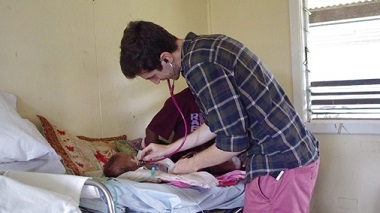
One of the biggest surprises for me when it came to the medical work was the belief surrounding spirits and sorcery. I was aware that in many other cultures in the world there is a deep belief in the power of spirits and that they can have a profound impact on people but I wasn't prepared for what I experienced while in Papua New Guinea. It is a commonly held belief that the main source of a persons illness is either that they have wronged the spirits or that someone has worked sorcery on them. This belief dictates how many people live and also their approach to healthcare. Many people will modify their behaviour in order not to offend the spirits, as they are scared of them! It also means that occasionally, when someone gets ill, the family will search for the person that worked sorcery on them in order to get revenge. Fear of spirits and sorcery is not something that is experienced by those in small tribes and villages alone but by those throughout the country, including many of the staff on the station. This poses a challenge to healthcare and ministry and must be addressed on both sides in order to properly care for people. It makes medical education difficult which in turns restricts the effectiveness of public health promotions.
The medical highlight for me came a few weeks in when we saw a lady who had had a difficult and prolonged labour - we spent a long time assisting her delivery and then helping her child. The reason it is my highlight is because it was the point at which I felt most useful, as well as helping in the medical aspect I had the opportunity to get my blood tested and donate some blood which we then gave to the mother in order to help her cope with the blood loss. The hospital does not have the capacity to keep blood and within the culture it can be very difficult to find willing donors.
Non-Medical Opportunities
I had many opportunities to get involved in lots of activities outside the hospital, which turned out to be the highlights of my trip over all. I got to spend time with people on the station and in the local community, which was an incredibly valuable opportunity to learn more about the culture, mission work and to make some great friendships! On the station there were a group of students (mainly aged 18-25) who were based there for 2 years to train as community health workers, which turned out to be the greatest opportunity to draw alongside people and have a lot of fun. I spent many afternoons and evenings with the male students and shared in fellowship and prayer with them as well as hanging out and playing sports.
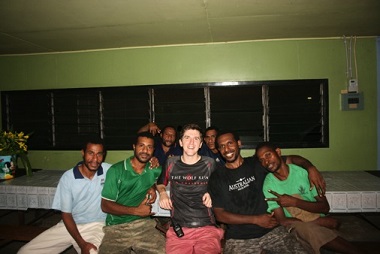
I also got to visit a few other places in western province, including the hospitals at Kiunga and Tabubil (the 2 closest towns and where we often referred patients), which was a great chance to see healthcare beyond Rumginae. The biggest difference I saw was when I went to a village a drive and boat ride away where there is an aid post with a community health worker. The post is an old building with 1 staff member that provides the healthcare for the village and many others in the surrounding area. I took some medical supplies and got to stay for a few days, which was very insightful. On another day I went along with the local youth group to a prison about an hours drive away where they were holding a service and performing some songs and dramas, we sat and had the service together and then shared in lunch with the prisoners.
I was able to get involved with lots of the activities of the church including sharing in Sunday services and attending their easter convention and the opening of a new church building in one of the local churches. On the easter weekend some of the hospital staff, students and patients went onto the ward to share the easter story and individual testimonies which was powerful to witness, they spoke with courage and conviction with the intention of sharing the love of Christ to all of the patients in the hospital.
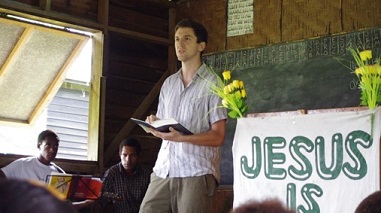
The highlight of my non-medical opportunities, and actually the highlight of the trip, was the week where I had the opportunity to lead the student's morning devotionals. We were working through Genesis 3:1-8 and it was great to be able to open Gods word with them and to encourage and be encouraged by them. It was wonderful to have the opportunity to be able to use my time and energy for that ministry as well as the medical work.
What have I learnt?
Although I was only in Papua New Guinea for 6 weeks the Lord has taught me a lot through the experience! Before I went I was struggling to properly integrate my Christian faith with my medical studies; I found that in normal life I was comfortable in my faith and sharing it with people but when I got into the hospital setting this all changed. I think it was because the fact that in our culture it is deemed rude or inappropriate to talk about things like that in a professional setting and that if you were to do it you would be breaking the rules.
Going to Rumginae helped me to see how faith and medicine matched up. The primary motivation of the station and hospital was driven by faith and it is clear that it is sustained through faith and trust in God. It also helped me to see that truly caring for a person as a whole included prayer, encouragement and sharing as well as medical treatment. A big buzz phrase in medicine at the moment is “holistic care” which means caring for the patient as a whole and it is commonly accepted and taught that this involved biological, social and psychological aspects but going to Rumginae on my elective helped me to recognize that this also involves the spiritual so we should be addressing it in our practice.
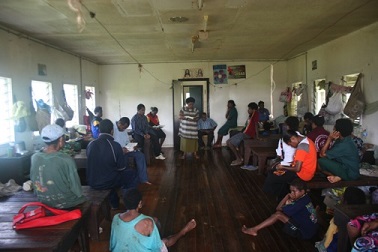
I also got to learn a lot about medical mission work, from very practical aspects to people experiences. The experience has helped me to see some of the highs and lows of long term mission work and I feel it has given me a very realistic view of it which was what I was hoping to achieve. It has encouraged me to pursue medical mission work as a possibility in the future but has also reinforced in me that God has a great plan for my life and that I can do great things by his power in any situation!
Conclusion and Thanks
The 6 weeks I spent in Papua New Guinea, although a whistle stop tour in comparison with long-term medical mission work, was a truly awesome experience. I got to do many exciting things and meet many great people and through these have learnt a lot about medicine, the culture, mission work and myself. I feel that the experience has improved my clinic knowledge and practice and has also strengthened my faith – especially within the medical field.
This experience would not have been possible without the help of many people! Dr Addy and the staff at Rumginae who helped plan the trip and welcomed me so wonderfully. The staff at UFM who helped me through the application process and gave huge amounts of advice (that I needed!). The Timios Trust who very generously gave me £300 to help cover some of the cost of travelling to Rumginae. Friends and family who prayed for and supported me throughout.
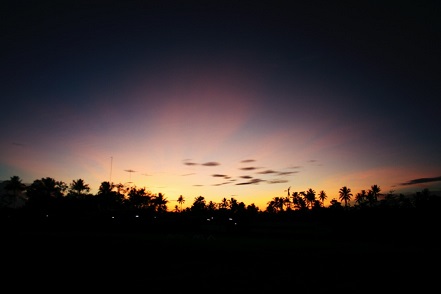
Thank you all!






























